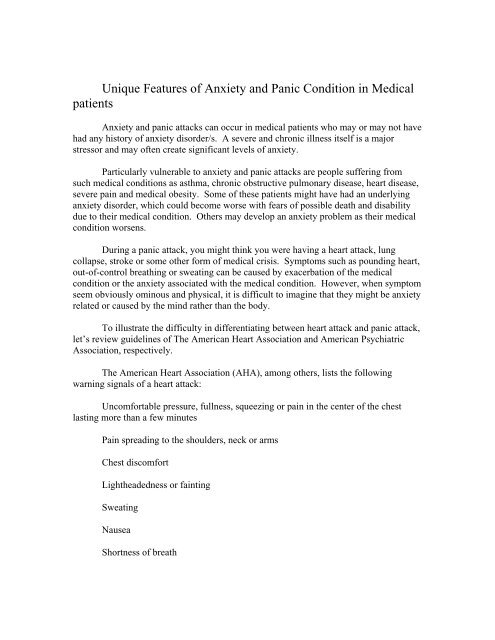Anxiety and Panic Attacks In Emphysema ... - Mind Publications
Anxiety and Panic Attacks In Emphysema ... - Mind Publications
Anxiety and Panic Attacks In Emphysema ... - Mind Publications
You also want an ePaper? Increase the reach of your titles
YUMPU automatically turns print PDFs into web optimized ePapers that Google loves.
Unique Features of <strong>Anxiety</strong> <strong>and</strong> <strong>Panic</strong> Condition in Medical<br />
patients<br />
<strong>Anxiety</strong> <strong>and</strong> panic attacks can occur in medical patients who may or may not have<br />
had any history of anxiety disorder/s. A severe <strong>and</strong> chronic illness itself is a major<br />
stressor <strong>and</strong> may often create significant levels of anxiety.<br />
Particularly vulnerable to anxiety <strong>and</strong> panic attacks are people suffering from<br />
such medical conditions as asthma, chronic obstructive pulmonary disease, heart disease,<br />
severe pain <strong>and</strong> medical obesity. Some of these patients might have had an underlying<br />
anxiety disorder, which could become worse with fears of possible death <strong>and</strong> disability<br />
due to their medical condition. Others may develop an anxiety problem as their medical<br />
condition worsens.<br />
During a panic attack, you might think you were having a heart attack, lung<br />
collapse, stroke or some other form of medical crisis. Symptoms such as pounding heart,<br />
out-of-control breathing or sweating can be caused by exacerbation of the medical<br />
condition or the anxiety associated with the medical condition. However, when symptom<br />
seem obviously ominous <strong>and</strong> physical, it is difficult to imagine that they might be anxiety<br />
related or caused by the mind rather than the body.<br />
To illustrate the difficulty in differentiating between heart attack <strong>and</strong> panic attack,<br />
let’s review guidelines of The American Heart Association <strong>and</strong> American Psychiatric<br />
Association, respectively.<br />
The American Heart Association (AHA), among others, lists the following<br />
warning signals of a heart attack:<br />
Uncomfortable pressure, fullness, squeezing or pain in the center of the chest<br />
lasting more than a few minutes<br />
Pain spreading to the shoulders, neck or arms<br />
Chest discomfort<br />
Lightheadedness or fainting<br />
Sweating<br />
Nausea<br />
Shortness of breath


